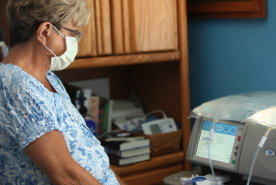October 27, 2025
Enfrentar una insuficiencia renal puede ser un desafío enorme, pero gracias a la diálisis, muchas personas continúan llevando una vida plena. Aquí aprenderás sobre los diferentes tipos de diálisis, cómo pacientes reales han ajustado su vida al tratamiento y qué recursos existen para acompañarte en el camino.
¿Qué es la diálisis?
La diálisis es un tratamiento que actúa como un sustituto parcial de los riñones cuando estos dejan de funcionar correctamente. A través de distintos métodos, se eliminan los desechos y el exceso de líquidos acumulados en la sangre, aliviando síntomas como la hinchazón, el cansancio extremo y las náuseas.
Entiende tu tratamiento y toma el control
Tu guía sobre la diálisis
Aprende más sobre los diferentes tipos de diálisis, accede a recursos de apoyo, y obtén información clave para adaptar tu vida al tratamiento.
Aunque no cura la enfermedad renal, es una herramienta fundamental que permite mantener el organismo en equilibrio y mejorar la calidad de vida de quienes la necesitan.
Existen dos modalidades principales de diálisis: la hemodiálisis, que utiliza una máquina y un filtro especial para limpiar la sangre, y la diálisis peritoneal, que aprovecha el revestimiento interno del abdomen como filtro natural. Ambas opciones buscan cumplir las tareas vitales que los riñones ya no pueden realizar y, con la orientación adecuada del equipo médico, pueden adaptarse a las necesidades y estilo de vida de cada paciente.
Los riñones realizan funciones vitales como:
- Filtrar desechos y exceso de líquidos.
- Regular la presión arterial.
- Controlar la producción de glóbulos rojos.
- Mantener el equilibrio de nutrientes como calcio y potasio.
Cuando los riñones fallan (enfermedad renal en etapa terminal), estos trabajos dejan de cumplirse y aparecen síntomas como fatiga, hinchazón y náuseas. La diálisis reemplaza parcialmente la función renal y ayuda a mantener la vida.
Tipos de diálisis
- Hemodiálisis: Usa una máquina y un filtro externo (dializador) para limpiar la sangre. Puede realizarse en un centro o en casa.
- Diálisis peritoneal: Utiliza el revestimiento interno del abdomen como filtro natural, introduciendo y drenando líquido de limpieza. Es un proceso que el paciente hace diariamente en el lugar donde más cómodo se sienta.
“La máquina actúa como un riñón. El proceso puede durar entre 3 y 4 horas y normalmente se hace 3 veces por semana”, explica William Henderson, vicepresidente de Renal Care.
Responde a nuestro breve cuestionario para saber si la diálisis en casa es adecuada para ti.
La vida después de iniciar diálisis
Comenzar la diálisis no significa detener tu vida, sino adaptarla. Muchos pacientes continúan trabajando, practicando hobbies y compartiendo con su familia.
- Ebony McKinley, trabajadora social, recuerda a un paciente que pensó que debía dejar su empleo al iniciar diálisis: “Le pregunté por qué si se sentía bien. Con el tiempo, se dio cuenta de que podía continuar con su rutina y hoy sigue trabajando a tiempo completo.”
- Reginald Gramling, paciente de 63 años, adaptó su horario de diálisis para seguir arbitrando partidos de baloncesto: “La vida sigue siendo buena, incluso con diálisis”.
- Cassandra Watkins comparte: “Es duro, pero me salvó la vida. Ahora mi equipo médico y otros pacientes son como una nueva familia”
¿Buscas maneras de pasar el tiempo durante tus sesiones de diálisis? Aquí tienes ocho actividades que puedes intentar.
Retos comunes y cómo superarlos
- Dieta renal estricta: Limitar sodio, azúcar, líquidos y potasio puede ser difícil. Pero recetas específicas para diálisis facilitan el proceso.
- Cansancio: Ajustar horarios y rutinas ayuda a sobrellevar la fatiga.
- Aspecto emocional: La diálisis puede ser abrumadora. El apoyo del equipo médico, familia y grupos de pacientes es clave.
Recursos útiles para personas en diálisis
- NKF Peers: Conéctate con un mentor que ha vivido bien con diálisis.
- NKF en Español: Un espacio para compartir experiencias, preguntas y recibir apoyo de pacientes y familiares que también viven con enfermedad renal.
- Recetas amigables para diálisis: Ideas de comidas bajas en sodio, potasio y fósforo.
- Kidney Learning Center: Cursos gratuitos en línea sobre trasplantes y donación renal en vida.
Si necesitas servicios que no aparecen aquí o transporte para ir a tus tratamientos de diálisis, habla con tu equipo de atención de diálisis. Ellos están ahí para ayudarte. También puedes contactar a NKF Cares para recibir ayuda de profesionales capacitados.
Puntos clave
- La diálisis sustituye parcialmente la función renal y permite seguir viviendo.
- Existen dos modalidades: hemodiálisis y diálisis peritoneal, cada una con ventajas según el paciente.
- Ajustar rutinas laborales, sociales y de ocio es posible con planificación.
- Seguir una dieta baja en sodio, azúcar y líquidos es fundamental para evitar complicaciones.
- El apoyo emocional y la educación sobre la enfermedad mejoran la calidad de vida.
- Recursos como NKF Peers en español y comunidades de pacientes ayudan a no sentirse solo en el proceso.
*Este contenido se proporciona solo con fines educativos y no pretende ser un consejo médico ni sustituir el consejo médico de un profesional de la salud.









